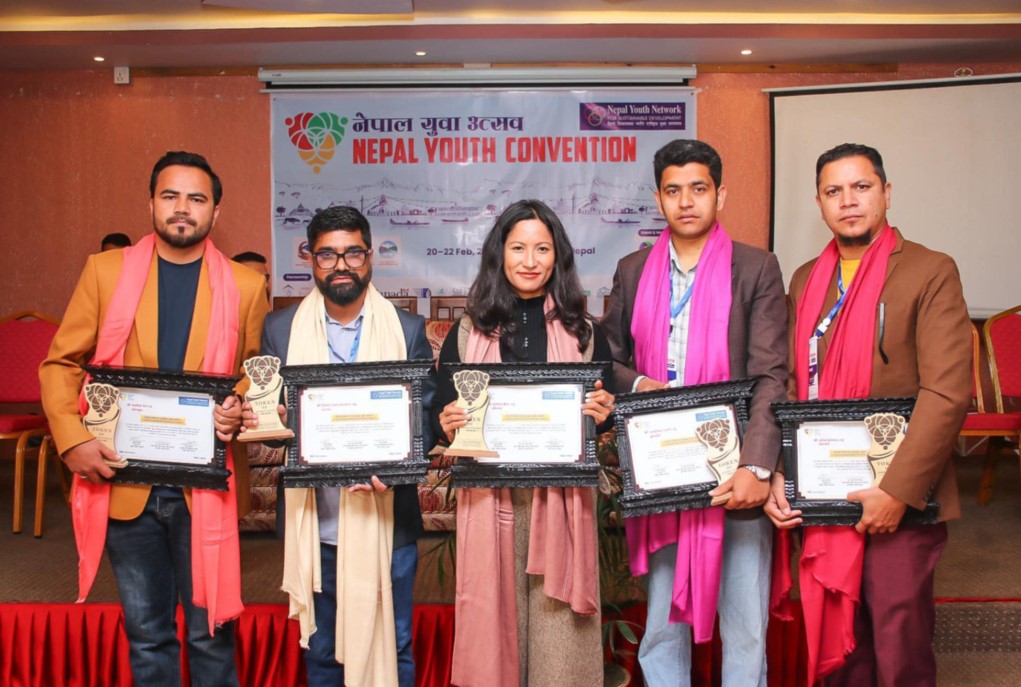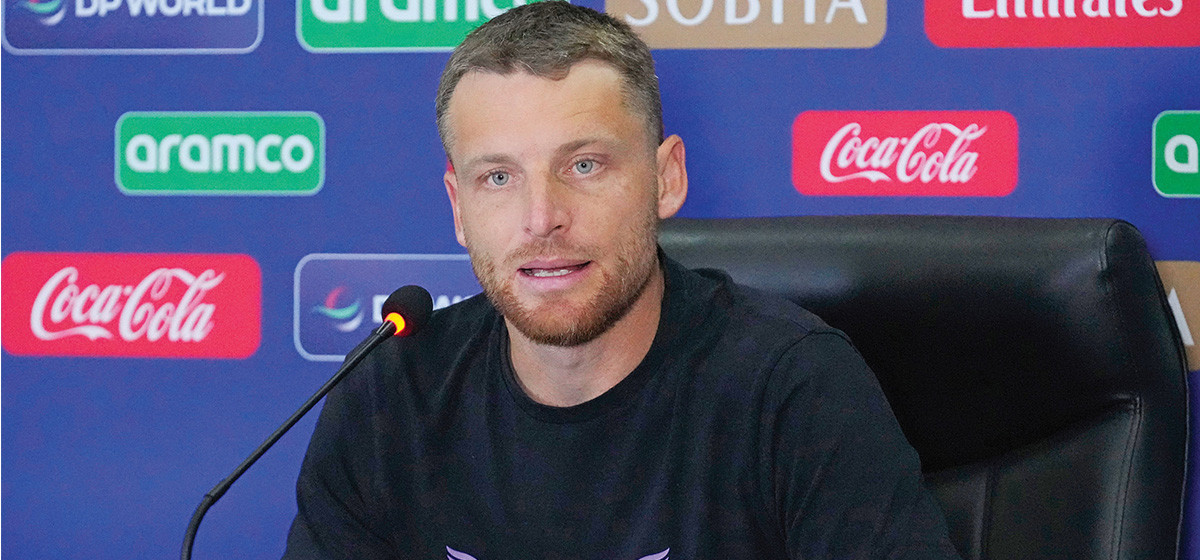KATHMANDU, April 26: There are limited films in the Nepali film industry, which have secured their place in the history of cinema. The first Nepali film 'Aama', the first color film 'Kumari', the first Silver Jubilee (run for several days in cinema halls) 'Jivanrekha', the Nepal-India investment 'Panchavati', the Oscar nominated 'Caravan' and the latest in this list is 'Prem Geet 3'.
This film is considered important in the Nepali film history because it was released simultaneously in Indian cinema halls for the first time and had the highest box office collection among Nepali films. This was a rare opportunity for any film made in Nepal. For this, actor Pradeep Khadka was credited.
He opened the door for Nepali films to be released in Hindi by dubbing them in India and showed opportunities for Nepali films. Because of this, he became not only a ‘hero’ on screen, but also emerged as the savior of the Nepali film industry.
On average, 80 to 90 films are made in Nepal every year. Due to Covid-19, the production of films has been slow for two years. As a result, only 46 films were released in 2079. If we add the number of foreign films, it becomes 132. The box office collection of all these is estimated to be more than Rs 1.62 billion.
‘Kabaddi 4’ has set an example that there is a good market for good Nepali films within Nepal. It has collected Rs 210 million only from cinema halls. Pradeep Khadka starrer 'Prem Geet 3' managed to earn more than Rs 75 million only from the Nepali version. ‘Prem Geet 3’ showed the sign of possibility by making almost the same level of box office collection in India as well.
The success of 'Prem Geet 3' has shown that Nepali stories can be sold in languages other than Nepali. Especially since this month, it has shown that Nepali 'content' can be sold in India, the country with the largest population in the world.
"But it's not easy to sell," said Pradeep Khadka, while speaking for Nagarik Nayak, “Only if the content is strong can we widen the path we have dug.” Pradeep says that he is using his heart, mind and strength to widen that path. Pradeep had to travel a long way to even think about it.
Dreamer boy
Swastima Khadka and Pradeep Khadka brand ambassadors for TVS NT...

Pradeep remembers a day from his childhood. He had come back from school disheartened. Some students showed their talent in school. They received applause but Pradeep was only a spectator there. There is one disadvantage of being a spectator: you have to listen to the praises of others and nobody cares about you!
His desire to be noticed drew attention to seeking praise. The reason being that he did not get an opportunity to stand on stage in school. He complained to his parents at home. His father reminded, "To stand on the stage, one must have a special talent." He did not know about the special talent, but when he became a teenager, his desire to attract the attention of others started to make him restless.
He remembered what his father had told him when he was a child - talent is needed to attract the attention of others! After that, he was eager to showcase his talent but he did not know what his talent was. He tried to sing songs with a guitar, participated in extracurricular activities in college. However, his desire to gain name and fame could not be fulfilled.
After completing his college studies, he had to take life seriously. When he was undecided whether to go to Australia or make a name for himself here, he made a film called 'Escape' with his friends.
"I made the film with the aim of making a name for myself and wanting to be recognized by the audience," recalls Pradeep. But this film flopped badly. He was not worried about that at all because he had not made the film with the aim of making money. When he saw himself on the poster of the film, that was enough for him.
"I don't know what happens in other people's lives, but in my life, one after another event coincided together," Pradeep told Republica, "When I saw myself on the big screen, I felt a sense of satisfaction, but at the same time, there was a rush for another job."
The film was released in theaters but it was not a hit. He was waiting for the next hit. The film 'Prem Geet' fulfilled that wait. Along with this, he emerged as a new ‘hero’ of the new generation. When he rose, the era of Rajesh Hamal was over. The film industry had announced a different new taste by producing 'Kagbeni'. The success of 'Loot' was considered to have touched the pulse of the audience. In such a situation, many expected that he would be able to avoid the need of a ‘lover boy’ in the mainstream through ‘Prem Geet’. Needless to say, the film was a hit. His image emerged as a romantic hero. In this way, his dream of making his identity known to a wide audience was fulfilled.
Another leap
Santosh Sen and his team came up with an ambitious film story. It was the story of ‘Prem Geet 3’ that was to be shot in the Himalayas. Everyone involved in the film was fascinated by the beauty of the Himalayan region and the story of the film. So the film unit was sure that this film would set another benchmark. The film's director Chhetan Gurung and Santosh Sen did not compromise on shooting and a beautiful Himalayan story was prepared.
While it was happening, the world was brought to a standstill by Covid-19. While the internal work of the film was going on, Pradeep and the film director Santosh reached Mumbai looking for the possibility of releasing the film in India as well. There, both felt that the era of 'content hunger' had begun. When cinema halls were shut down, films from all over the world on various subjects were seen reaching people's hands on the OTT platform. He was sure that if he could give something new to the audience who were tired of stereotyped stories, he would find a new way for Nepali films. For this, he talked to several studios to release the film in Mumbai.
After several stages of negotiations, efforts and expenses and the benefit of visiting Mumbai for more than six months, his film was released in the Hindi language in different parts of India.
"If they had known how difficult it would be to do this work, maybe no one would have tried," he opened up to Republica, "Because we didn't know anything, we jumped into the water and learned to swim."
Needless to say, 'Prem Geet 3', dubbed in Hindi, emerged as beautiful news after the terror of Covid-19. Its collection in India was double the investment. The film's investment was around Rs 40 million. It has doubled the business in India alone. In Nepal, it became the highest grossing film after 'Kabaddi 4' and 'Chakka Panja 4'.
Another dream he saw as an actor came true. Also, some people do advise him to struggle in Bollywood. But he is clear that that path is not for him. "If I stay in the country and make a film internationally, it will be the biggest contribution," he says.
Future plans
The international market rotation of 'Prem Geet 3' taught him one thing - we should emphasize on content. If you can make interesting films with good subjects, there is a market all over the world. If we can't make good films, there is no future even in Nepal. This is known from the long list of failed films released every year. This was the reason behind the 36 Nepali films released last year achieving unimaginable success.
The challenge is to continue making films that can go to the world level while maintaining the ways that Nepali films have made to appeal to the Nepali audience so far and widening the path of Prem Geet 3. This challenge has become the way forward for him.
Rather than the big market of Hindi films, his aim is to establish his creations well, from the mountain ranges of Bhutan to Dehradun in India. It requires a lot of effort.
The environment of corporate film-making in Nepal has not yet been created. At one time, Chaudhary Group made a Nepali film 'Basudev' and looked for possibilities in it. Similarly, it tried to 'do something' in the entertainment industry by setting up 'CG Entertainment' a few years ago. Through 'Kagbeni' and 'Sano Sansar', Quest Entertainment also tried to teach 'Corporate Culture', but all those efforts ended up being limited to just 'attempts' for the film industry.
"Now the golden opportunity has come for the film industry to expand itself," said Pradeep, enthusiastically, "For that, good filmmakers should work in the style of a corporate house to stabilize the domestic market and expand their foothold in the foreign market."
Who will do that work? Pradeep says, "Others may also do it, but I am working on a collective effort." With the help of some friends, I am preparing to produce at least four films a year, out of which at least one film will hit the foreign market.”
The previous year was encouraging for him. In terms of market, he reached India and even in Nepal he got to work in a standard film. 'Prakash' is also included in the list of good films made in the previous year. During the conflict, he played the role of a desperate young man who was studying, so much so that even the critics praised him for a commercial film, 'Kamino’. He is confident that 2080 will also be exciting in the same way. For that, he narrated the story of 'Kamino'. He is confident that 'Kamino' will become a standard film about how a Nepali travels to the United States through South America in pursuit of his American dream. He believes that such films will keep him alive for years.









































